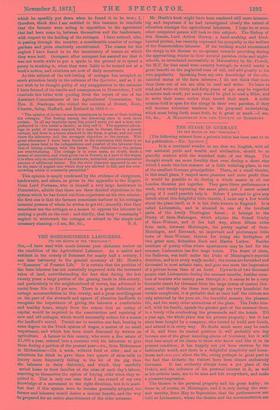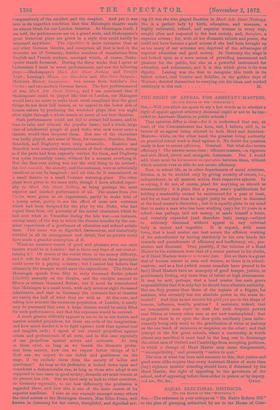THE STAGE IN GERMANY.
rre THE EDITOR OF THE "SPECTATOR.")
[The following extract from a private letter has been sent to us for publication.—En. Spectator.] . . . . It is a continual wonder to me that we English, with all our national pride and wealth and civilisation, should be so placidly content with the wretched state of our Stage. The thought struck me more forcibly than ever, during a short stay which I made this last summer at a little watering-place, in one of the smallest German principalities. There, at a small theatre, in this small place, I reaped more pleasure and more profit than it would be possible to do during a whole season in all our London theatres put together. They gave three performances a week, very rarely repeating the same piece, and I never missed going if I could possibly help it. Before I proceed to give any details about this delightful little theatre, I must say a few words about the place itself, as it is but little known in England. It is called Liebenstein, and is situated in one of the loveliest parts of the lovely Thuringian forest ; it belongs to the Duchy of Saxe-Meiningen, which adjoins the Grand Duchy of Saxe-Weimar, and it lies half way, about fifteen miles from each, between Meiningen, the pretty capital of Saxe- Meiningen, and Eisenach, an important and picturesque little town of Saxe-Weimar, famous for being the birthplace of two great men, Sebastian Bach and Martin Luther. Besides numbers of pretty villas where apartments may be had for the summer, Liebenstein has five large hotels. The finest of them, the Bellevue, was built under the Duke of Meiningen's especial direction, and is in every waylit model ; the rooms are furnished and decorated in most artistic taste, and give one more the impression of a private house than of an hotel. Upwards of two thousand people visit Liebenstein during the summer months, besides num- bers of tourists who merely pass through it ; it seems to be a very favourite resort for Germans from the large towns of central Ger- many, and though the three iron springs are very beneficial for certain complaints, it is probable that at least half the visitors are only attracted by the pure air, the beautiful scenery, the pleasant life, and the many other attractions of the place. The Duke him- self, with his family, spends the greater part of the summer there, in a lovely villa overlooking the promenade and the hotels. Till a year ago, the whole place was his private property ; but it has since been bought by a company, who intend to build new hotels, and extend it in every way. No doubt much more may be made of it, and from its central position it will probably one day become one of the great watering-places of Germany, but it will then lose much of its charm to those who know and like it in its present condition ; it has happily not yet been overrun by the fashionable world, and there is a delightful simplicity and home- liness and sans gene about the life, owing perhaps in great part to the fact that hitherto the visitors have been almost exclusively Germans. It has evidently always been a pet place of the Duke's, and the influence of his personal interest in it, as well as his artistic taste, are to be seen and felt everywhere, and make a pleasant impression.
The theatre is his personal property and his great hobby; its home is, of course, at Meiningen, and it is only during the sum- mer months, from May to September, that the performances are held at Liebenstein, where the theatre and the accommodation are comparatively of the smallest and the simplest. And yet it was here in its imperfect condition that this Meiningen theatre made me almost blush for our London theatres. At Meiningen itself, I am told, the performances are on a grand scale, and Shakespeare's great historical plays are given in a style that could hardly be surpassed anywhere. The re'pertoire is more extensive than at any other German theatre, and comprises all that is best in the dramatic art of 'Germany, besides numbers of translations from English and French authors, amongst which, of course, Shake- speare stands foremost. During the three weeks that I spent at Liebenatein I went to seven performances, and saw the following plays :—Shakespeare's Much Ado About Nothing and Twelfth .2Vight ; Lessing's Minna von Barnhelm and Miss Sara Sampson ; Moliere's Malade Imaginaire ; two scenes from Schiller'e Don Carlos; and two modern German farces. The best performance of all was Much Ado About Nothing, and I am convinced that if Shakespeare could be played like that in London, our Managers would have no cause to make their usual complaint that the good things do not draw full houses, or to appeal to the lower side of human nature by producing the wretched plays that run night after night through a whole season at many of our best theatres.
Such performances could not fail to attract full houses, and in time to raise and educate the popular taste ; and a whole large class of intellectual people of good taste, who now never enter a theatre, would then frequent them. Not one of the characters was badly played, and some of them, for instance, Beatrice, Hero, Benedick, and Dogberry were truly admirable. Beatrice and Benedick were complete impersonations of their characters, acting as if the parts had been expressly written for them, and Dogberry was quite irresistibly comic, without for a moment overdoing it. But the first-rate acting was not the only thing to be noticed ; the tout ensemble, the scenery, and the costumes, were as artistically excellent as can be imagined ; and all this, be it remembered, at a small theatre in a small German watering-place. The other plays were given in the same style, though I have alluded especi- ally to Much Ado About Nothing as being perhaps the most superior and finished performance of all. The scenes from Don Carlos were given as an experiment, partly to make trial of a young actor, partly to see the effect of some new costumes which had been designed for the play by the Duke, who had copied them from old portraits of the actual characters which he had seen when at Versailles during the late war,—an instance, among many, of the way in which the theatre benefits by the con- stant supervision of a gentleman of education and refined artistic taste. This scene was so dignified, harmonious, and historically truthful in all its arrangement and detail, that no painter could have made a grander conception of it.
What an immense source of good and pleasure even one such theatre would be in London ! but is there any hope of our ever at- taining it ? Of course at the outset there is the money difficulty, and it will be said that a theatre conducted on these principles could never be a paying concern ; but I cannot but believe that ultimately the receipts would meet the expenditure. The Duke of Meiningen spends from fifty to sixty thousand florins (about /15,000) annually on the theatre, and the receipts amount to fifteen or sixteen thousand forms; but it must be remembered that Meiningen is a small town, with only seven or eight thousand inhabitants, and that in Germany the entrance-fees at theatres are barely the half of what they are with us. At this rate, and taking into account the enormous population of London, it surely may be presumed that even a large theatre would be easily filled for such performances, and that the expenses would be covered.
A much greater difficulty appears to me to lie in our foolish and narrow-minded prejudices, for these are evils of the imagination, and how much harder it is to fight against such than against real and tangible evils ; I speak of our absurd prejudices against artists and professionals of all sorts, and in this case especially of our prejudices against actors and actresses. As long as these exist, as long as we banish the dramatic profes- sion from society, how can we expect better things of it ? How can we expect to see ladies and gentlemen on the stage, if we exclude them from the society of ladies and gentlemen? As long as the profession is looked down upon and considered a dishonourable one, as long as those who adopt it are supposed to lose caste in good society, dramatic art must remain at its present low ebb. But we have only to look to other countries, to Germany especially, to see how differentlx the profession is regarded there, and how this is one of the main causes of its superior condition. I take as one example amongst many others the chief actress at the Meiningen theatre, Miss Ellen Fran; well known in Germany for her clever, thoughtful, and dignified act- ing (it was she who played Beatrice in Much Ado About Nothing). She is a perfect lady by birth, education, and manners, a highly cultivated, refined, and superior woman in every way, sought after and respected in the best society, and, therefore, a superior actress ; for, with all her dramatic talents and power, she could not have become a good actress if she had been brought up. as too many of our actresses are, deprived of the advantages of superior education and good society. In Germany the stage is- not looked upon as a mere means of providing amusement and pleasure for the public, but also as a powerful instrument for- education and refinement, and it is this which gives it its true dignity. Leasing was the first to recognise this truth in its- fullest extent, and Goethe and Schiller, in the golden days of Weimar, devoted themselves to carrying out his ideas, and worked



































 Previous page
Previous page